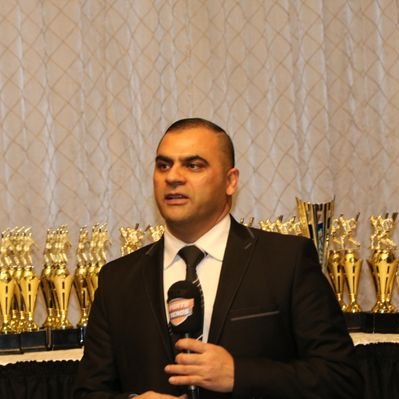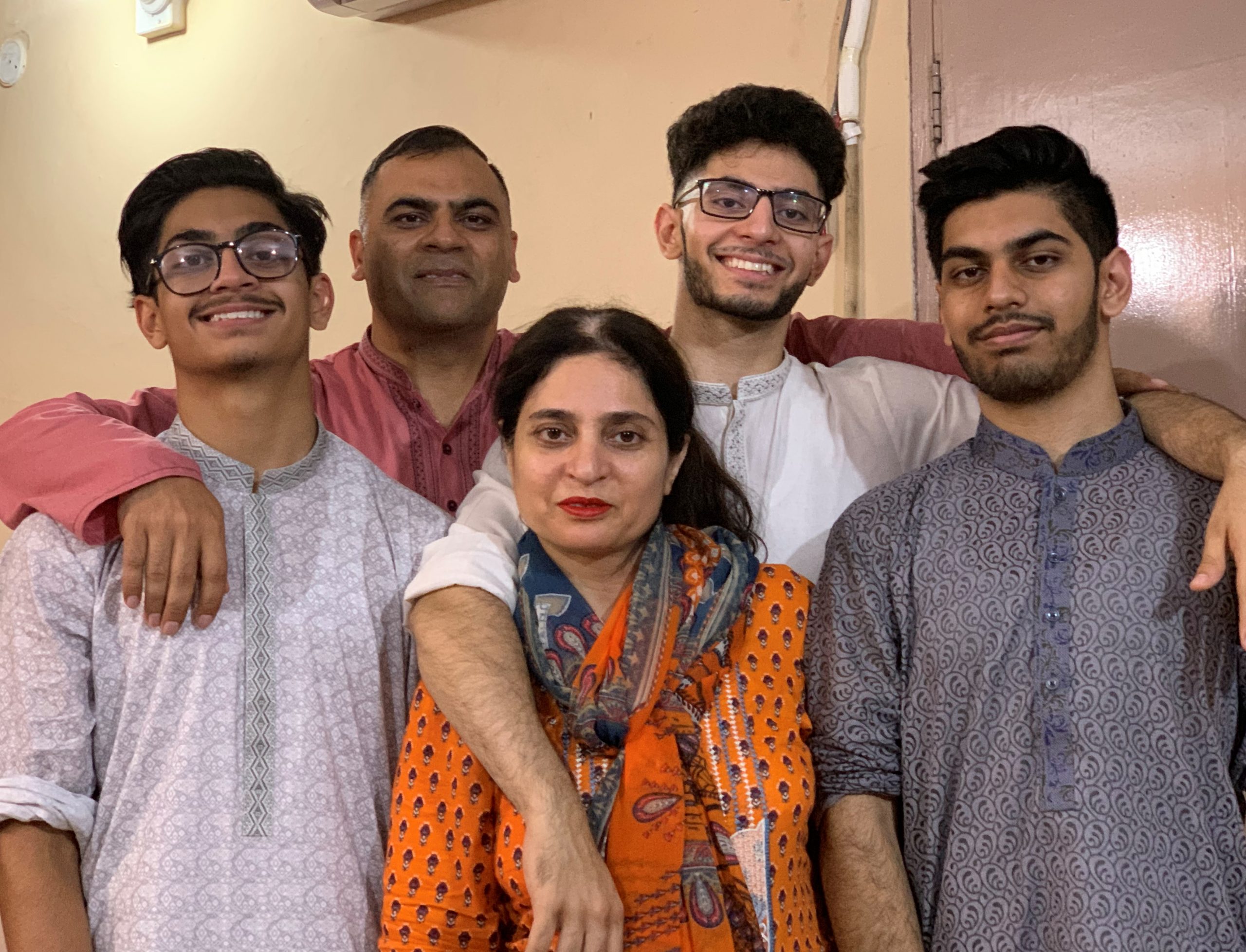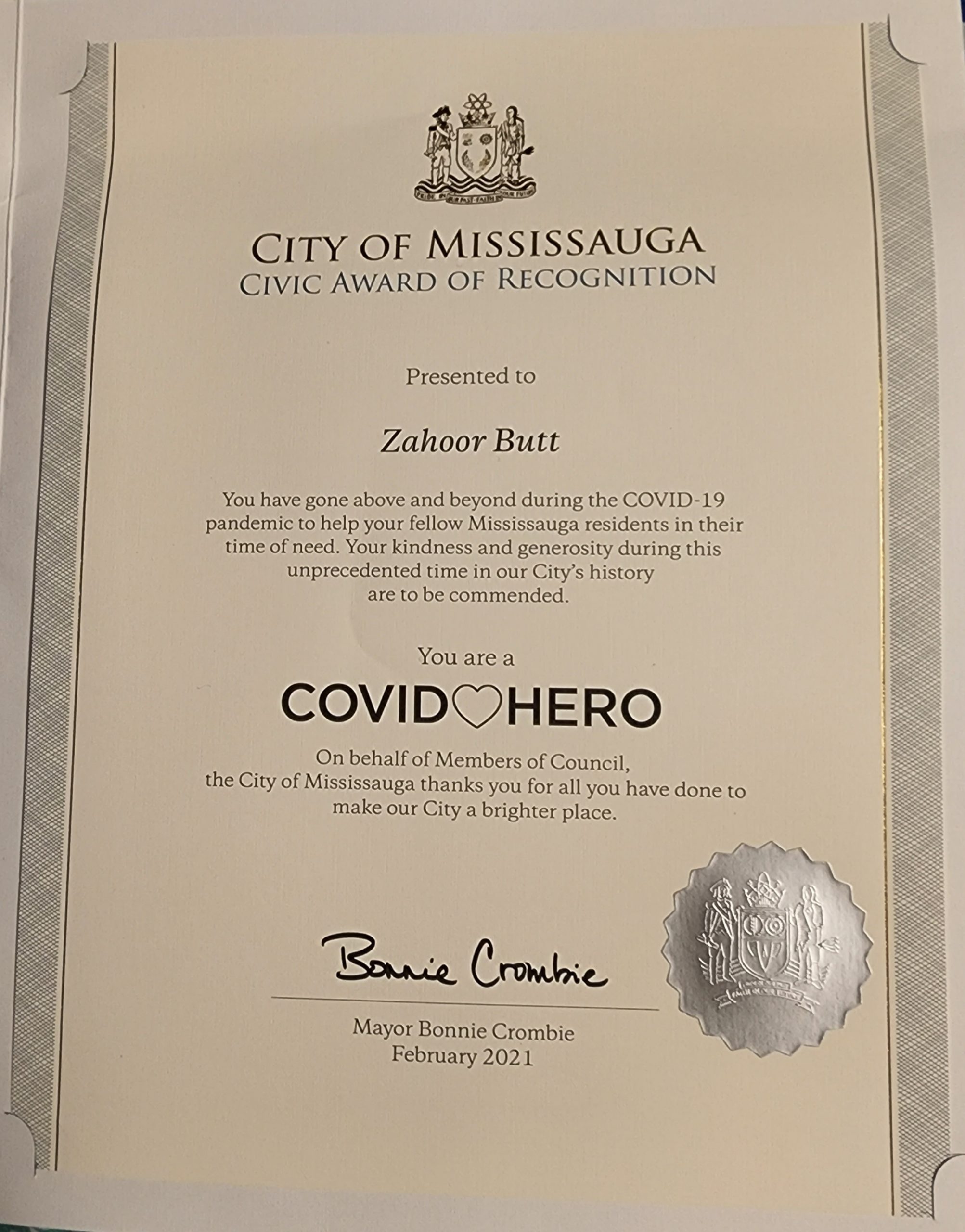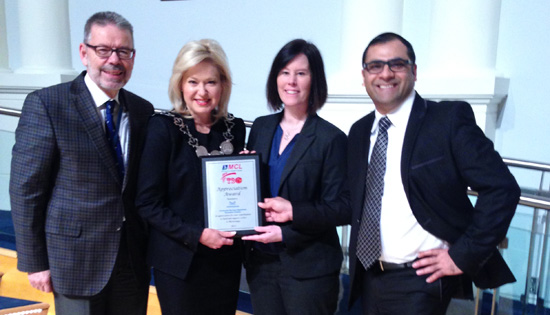Following my Father to the Cricket Field: A Pakistani Man’s Road to Canada

Following my Father to the Cricket Field: A Pakistani Man’s Road to Canada
By: Justine Lyn
Zahoor Yusuf Butt was born in Lahore, Pakistan in 1972.
Growing up, he had an intense bond with his family who loved, supported, and encouraged one another. Zahoor was an obedient son, who respected his father and wanted to do what he could to follow his fatherly advice and wisdom. Little did he know back then that this would take him on a journey across the globe to not only follow his own dreams in Canada, but also honour his father on the cricket field.
The family first accompanied their father to Saudi Arabia where he was working. Zahoor remembers, “[my father] called all his family over there and then we moved there when I was in grade 10. And then I did my high school from Saudi. […] So, this is where my childhood started as well”.
As was custom, most students in his high school wanted to travel to the United States for their higher education. Though Zahoor applied as well, his visa was denied, so he instead went back to Pakistan for his higher education. At the time, “I was so disheartened that I really wanted to go and do some good studies and be an engineer,” Zahoor remembers.
He became determined that he would one day have his opportunity to shine, so he studied hard. “I did my bachelor’s degree in mathematics and statistics. And then I did master’s degree in computer science,” says Zahoor proudly.
Zahoor enjoyed his education, travelling around Pakistan and visiting his family when his father suggested he get married. ““Now it’s the time,” [said my father]. So, I got married,” recalled Zahoor.
After his marriage to his wife, a native of Pakistan as well, they moved to Saudi Arabia to work and live together. They lived there for about three years before immigrating to Canada. “If I tell you where I am today it is just because of my dad because this was his vision or his idea to send me to Canada. […] If you remember [the] year 2000, the IT was booming all over the world. And I was in software development at that time,” so it was thought by his father that this move would be advantageous, explained Zahoor. “My father told me that this is the country where you can build your family out there and live forever and own your things,” and being obedient, Zahoor believed his father and though he was anxious, he took the leap of faith and came to Canada.
The adjustment was extremely difficult. “my son was 10 months old when we came over and my wife was pregnant with the second child. And that was another exciting adventure, I would say and challenges. I did not have [experience with] living alone away from my family. That was a huge difference because I always lived with my family, even in Pakistan. […] But when I came to Canada, I was completely alone. Strange. Nobody’s here [when] I landed in Mississauga,” remembered Zahoor. Worse still, “I came as a skilled worker in IT. Unfortunately, the time I came was not right because I came [on] 7 October 2001. And then September 11 happened a few weeks before I came in. So, it was a big disaster in the IT industry [and] the job market was really down.” There was no work to be had. “My savings that I brought in was flushing out really quick and I was like, “where is the job?” Wherever applied, no reply. What’s going on?” Zahoor questioned.
Perhaps he would have given up if not for his father. Zahoor remembers, “my dad kept on supporting me. “Keep on applying. You going to get it. I know you get it one day,” [my father said].
So, I learned, I make myself try to adapt the culture. Try to adjust to it, to see this is a different world. I cannot expect what I had before all the luxurious life in Saudi Arabia. But this is a self-made country. You have to do your own. Everything you go out and get it. It is there for you,” explains Zahoor. Looking back, he loves this do-it-yourself culture in Canada because when you do eventually make it, you feel you have really achieved something great.
Further, there is an understanding that everyone must start somewhere, so there is no shame in putting in a hard day’s work.
One day, Zahoor remembers, “I was so frustrated and at the same time scared that I had only $2000 left and this is almost one last month for my rent and the groceries. And I was really getting nervous. I have my small kid and my wife to take care of. […] I was passing by a road asking, “God, please get me a job, whatever it is”.
I was looking around and there was a McDonald’s there, and it said, “help wanted”. And I just went inside and met with the supervisor and I introduced myself. I had my resume because I was dropping my resume wherever. So that manager is looking at me, “you have a Master’s in computer science, what are you doing here?””
What was he doing there? All he could do was be honest. Zahoor told the man, ““I have my family to feed I will do whatever you want me to do.” So I brought myself real down to the bottom and forgot what I was, what I am. […] That gentleman, I would commend a lot. He felt my pain and need and then he offered me a job. And then I started my career from McDonald’s and within first three months, I got another job because once you get into the flow, you start getting offers.”
Zahoor was working in, “one of the busiest places of McDonald’s”. It was a hard job he remembers, “You can’t even breathe, and you just keep on flipping burgers over there. So, this is where I started. And then I had two locations to work on once they trained me from there. And I worked hard because I was so focused, dedicated, hardworking individual putting all the efforts to do the job well done. They really liked me,” recalled Zahoor.
He then got a job at a car rental agency interacting with customers at the front desk. Though he thought about quitting McDonald’s, he had become invaluable to them, so he began balancing both jobs because, “they helped me in needy time.” As such, Zahoor recalls, “I did not quit. I kept working for three years, continuously, from 8:00 AM to 5:00 PM to my rental company and from 7:00 PM to 1:00 AM at McDonald’s”.
Over the next few years, the IT industry was beginning to recover and Zahoor was itching to return to the industry he loved. Better yet, he now understood the Canadian job market. Zahoor explains, “I understand how people are getting job, why I am not getting job in IT because the technology was changing, and I was not up to that technology mark”.
He knew what he needed to do, “I went to Ryerson University. […] Then I did my iNet certification from Ryerson University. I showed them my master’s degree. They said, ‘This is perfectly fine. You don’t need another degree; just go for a fast track program that we have to put you on a job right there.’ So this is exactly what happened. I completed my course at nighttime while I was working. And then I got a job in IT back in 2006. And that was really moving forward. I never looked back. So, I kept on growing,” stated Zahoor proudly.
“As soon as I finished my certification in Ryerson University, I got a [contract] job in downtown Toronto. […] That owner really supported me as well. […] I worked really hard over there. Wherever I go, I just want to be the best and try to do the best I can to do the job all the time,” explained Zahoor.
His first project was working with a fire department to automate their process, an act which undoubtedly has real-life implications that help their life-saving operations. He was so proud when he completed the job successfully, and clearly so was his employer. Zahoor remembers, “[my boss] wrote a very nice recommendation letter for me,” that was how he received his first recommendation letter from an IT company.
After that, more jobs came to him.
He worked for Sapphire, formally the CNC Global company, where he worked a few days a week. “[The] very first day, they asked me questions, “Can you do this, can you do that?” I said, “Yes. Why not?” […] I was so keen to work and put my foot into the door and I did it for them. […]
Then that company also supported me. I went back to Ryerson University and I started learning the project management courses,” explained Zahoor. He implemented what he learned into a Groupon-type product called “Jump Rewards”. He was proud and ready to move on to a new adventure.
“I made a move to Salvation Army, a not-for-profit organization, as a manager of software development. So I kept on growing and learning because I had the project management experience as well as the IT software development background. So, I was a manager for the whole Canada and Bermuda locations. […] It was amazing experience for me, how I achieved my ultimate goal,” said Zahoor.
“After a successful career at the Salvation Army, I started to launch my own IT company and started working for contractors, working for another company where I, again, worked as a manager and developed a courier related product called Global,” explained Zahoor. “This system helps all the courier companies to pick and drop the package from one location to another. […] I learned business quickly. And because of my systematic approach, I know how to automate the manual processes. […] It gave me a lot of confidence”.
Though his professional life was shaping up, he never forgot his family. After all, it had been his father who had convinced him to come to Canada. The plan had always been to gain some experience and money and then sponsor his father who would join him in Canada, then slowly the rest of his family would follow.
However, it was not to be.
“My father died in 2003. […] It was so heartbreaking, you know why? I did not have my job in 2002, but when […] I got another job, so I had enough money now working in two jobs to apply for my dad in 2003. […] One day I was talking to my dad, [saying,] “now I’m ready to sponsor you. I have everything that is needed. I did all the research.” And in the same week, unfortunately my father died while he was driving with a heart attack,” explained Zahoor.
He had been so close, but fate had other plans. His father had been the one to encourage the entire family and when he died, it seemed that hope had gone with him. “Parents are amazing. […] You know if you need help, your parents will take care of you. In this zone, you continue working. So, when they are gone, you feel like you are alone, you can do nothing,” reflected Zahoor.
In his father’s absence, Zahoor’s wife diligently kept their family together. “My family supported me, my wife, especially. […] She had three kids; it was a big 24/7 job. […] It is huge, huge work she has done, and I’m telling you, she worked harder than me,” admitted Zahoor.

Throughout everything, Zahoor’s wife encouraged him to continue and never give up on the things that made him happy and his father proud. “I was remembering my dad doing the good stuff [and] that’s what he wanted me to do. […] Although he’s not alive, I wanted to continue what he wanted me to do over here,” explained Zahoor.
Zahoor remembered the good memories he had with his father, recalling, “My father always encouraged us to go out of the field and play [cricket]. I never forgot that my father wanted to have us go play outside. So in 2013, […] I joined a cricket club over here in Milton. […] Within the one year of [playing], we started playing in Mississauga. […] They saw me that this person is really energetic and putting a lot of effort in play. […] They spoke with me [saying], “We don’t have a league in Mississauga. Why don’t we form a league in Mississauga?””. Previously, players would have to travel to Toronto or Brampton, so Zahoor and others thought, “why not?”.
And together, they formed Mississauga’s first cricket league. As secretary, Zahoor took care of the league’s logistics and IT as well. Eventually, he rose in the ranks to become the president of the Mississauga cricket league.

They grew from five clubs in the league to ten the next year, and in subsequent years, the clubs continued to grow exponentially and today there are over 100 clubs.
This, too, is in part thanks to Zahoor’s father. “Everything I was doing for my father, in his good memories. […] It is a voluntary thing, it is very hard to put your time and effort for nothing, so unless you have a passion or some cause behind, [this volunteer work is hard to maintain]. I was the only one living in my dad’s good memories,” explains Zahoor.
With so many clubs playing each and every week, they began to run out of fields to play in! In 2016, Zahoor went to Mississauga Council to make a direct appeal to Mayor Bonnie Crombie and city councillors. “I went for a five-minute speech and presented my case that it’s a growing sport in Mississauga so we [need] more cricket fields to accommodate the growing trend. […] They supported me [and] promised me to build more grounds in the city of Mississauga. So they built two more grounds for us [and] they have one or two more coming in future. So that was a good […] gesture from the city of Mississauga to support the growing sport of cricket,” says Zahoor thankfully.
After all, cricket is not just about the sport, it is also about our heritage. Britain originally introduced cricket to their colonies whether in Canada, Asia, the Caribbean, and elsewhere. As such, it is part of our history that connects so many of us from all over the world. Zahoor explains, “[Cricket] is a big craze [in] countries where resources are limited. People are playing on a rough field, on roads or don’t have grounds, they’re still playing.” You do not need anything fancy, you just need to play and have fun! Zahoor explains that, “so many people know me from different cultural backgrounds,” and they all play together in harmony. Just as Zahoor’s own father passed on his love of cricket to his son, Zahoor did the same for his own children, making his own family memories.
Now a father himself with experience under his belt, Zahoor can give his own fatherly wisdom to the next generation, just as his own father did for him. “You know, one thing I learned here after so many years, that only human can give happiness to another human. If I just live alone with my luxurious things, I will be bored. I will be not happy. But what I can give you as a human is happiness, [nothing] else can [do that],” says Zahoor.
Therefore, “all we have to do as a human [is] take care of each other and help each other. […] That’s the magic,” explains Zahoor. In the same way that the act of giving Zahoor a job when he truly needed it all those years ago was a simple deed that meant so much, Zahoor pays it forward by helping others whether on the cricket field or off.
To those new to the country or wanting to fit in, Zahoor encourages us all to, “Be positive! Come with a positive energy and learn the environment, mix with the culture. And then you get your step in”.




